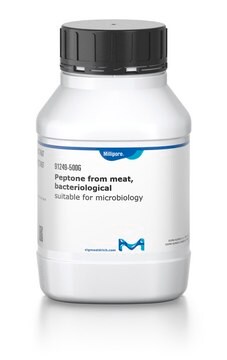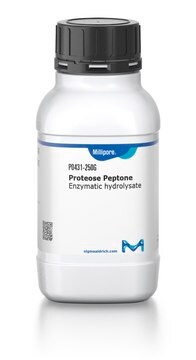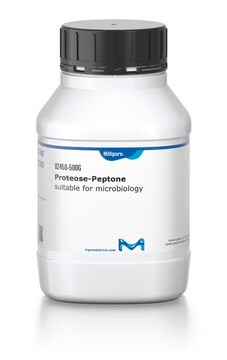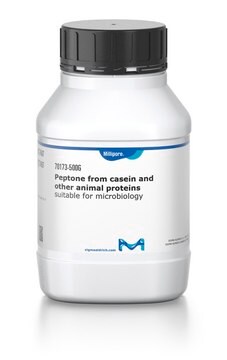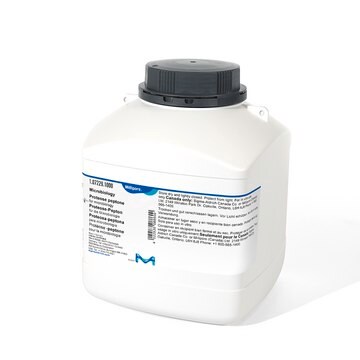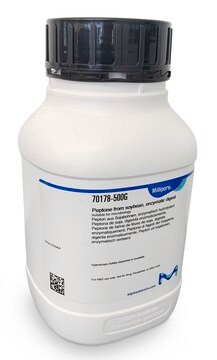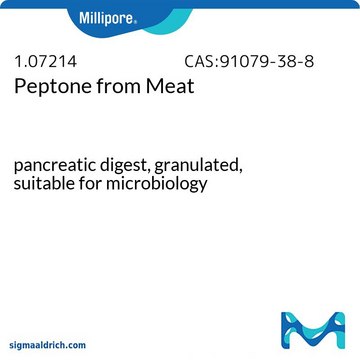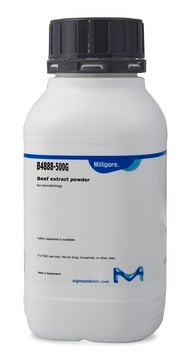Recommended Products
biological source
animal (meat)
Quality Level
form
powder
nitrogen analysis
≥10% total
loss
≤6% loss on drying
application(s)
microbiology
SMILES string
O(C)C(=O)C(CCC(CC)(CC)C)C(=O)OC
InChI
1S/C13H24O4/c1-6-13(3,7-2)9-8-10(11(14)16-4)12(15)17-5/h10H,6-9H2,1-5H3
InChI key
AIUDWMLXCFRVDR-UHFFFAOYSA-N
Looking for similar products? Visit Product Comparison Guide
Related Categories
General description
Peptones are protein hydrolysates and widely used components of microbial media. Peptone serves as an organic nitrogen source for culturing microorganisms.
Application
Peptone from animal tissue has been used:
- to prepare neutralizing solution for viable cell count assay
- to prepare decimal dilutions of the sample (cheese) for microbiological analyses
- in bolus liquid solution of amino acids to examine the effect of amino acid infusion in the stomach or intestine on specific dynamic action (SDA)
Storage Class Code
11 - Combustible Solids
WGK
WGK 3
Flash Point(F)
Not applicable
Flash Point(C)
Not applicable
Personal Protective Equipment
dust mask type N95 (US), Eyeshields, Gloves
Choose from one of the most recent versions:
Already Own This Product?
Find documentation for the products that you have recently purchased in the Document Library.
Customers Also Viewed
Andrew Cyr et al.
The Science of the total environment, 664, 761-770 (2019-02-15)
Several species found in the Bering Sea show significant spatial variation in total mercury concentrations ([THg]) longitudinally along the Aleutian Island chain. We assessed [THg] in other members of the Bering Sea food web to better understand the factors shaping
Casey T Clark et al.
Scientific reports, 9(1), 5843-5843 (2019-04-12)
Analysis of stable carbon and nitrogen isotope values (δ13C and δ15N) of animal tissues can provide important information about diet, physiology, and movements. Interpretation of δ13C and δ15N values, however, is influenced by factors such as sample lipid content, tissue-specific
Features and performance of edible films, obtained from whey protein isolate formulated with antimicrobial compounds
Ramos QL, et al.
Food Research International, 45(1), 351-361 (2012)
Ó L Ramos et al.
Journal of dairy science, 95(11), 6282-6292 (2012-09-04)
The objective of this work was to evaluate the effectiveness of antimicrobial edible coatings to wrap cheeses, throughout 60 d of storage, as an alternative to commercial nonedible coatings. Coatings were prepared using whey protein isolate, glycerol, guar gum, sunflower
Michael Pistorino et al.
Biotechnology progress, 25(5), 1364-1371 (2009-07-28)
The recent use of heterologous hosts to produce natural products has shown significant potential, although limitations still exist regarding optimal production titers. In this study, we utilize micro-scale cultures and well-defined screening methods to identify key medium components that influence
Our team of scientists has experience in all areas of research including Life Science, Material Science, Chemical Synthesis, Chromatography, Analytical and many others.
Contact Technical Service